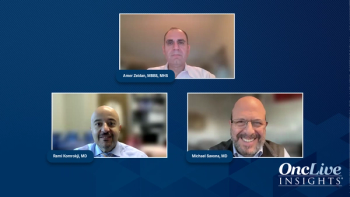
Opinion|Videos|August 15, 2024
Expert Perspectives in Monitoring and Management Strategies for CRS, ICANS, and Other Long-Term Toxicities Associated with CAR T-cell Therapy
The panel explores laboratory parameters routinely monitored for CRS and ICANS, including monitoring frequency, and discusses prophylactic measures and safety management strategies employed to address these complications in CAR-T therapy.
Advertisement
Video content above is prompted by the following:
- What labs do you routinely monitor for CRS and ICANs – and how frequently?
- What type of prophylaxis and/or safety management are you applying to address CRS and ICANs?
- Does your institution have a standard operating procedure or guideline?
- What percentage of your patients have required either steroids, tocilizumab, and/or anakinra for CAR-related toxicities?
- What are some other pertinent acute and long-term toxicities of CAR T-cell therapy to monitor for?
- Do you utilize antimicrobial prophylaxis, growth factor agents and IV immunoglobulin in your practice?
- When weighing treatment options, how heavily is CAR-T AE profile considered?
- Does the safety profile of obe-cel change your perspective of using CAR-T? If so, how may it potentially affect your decision making?
Advertisement
Latest CME
Advertisement
Advertisement
Trending on OncLive
1
FDA Approves Daratumumab and Hyaluronidase Plus VRd for Newly Diagnosed Multiple Myeloma
2
NP-G1-044 Receives FDA Orphan Drug Designation for Pancreatic Cancer
3
PD-L1 Expression Is More Predictive of Response to Pembrolizumab on Metastatic Sites in High-Grade Serous Ovarian Cancer
4
Meta-Analysis Characterizes Nivolumab/Ipilimumab Hyperprogression in Renal Medullary Carcinoma
5



































